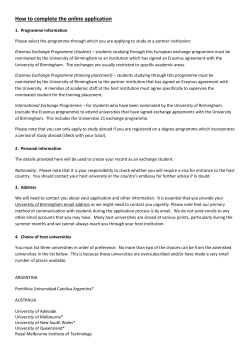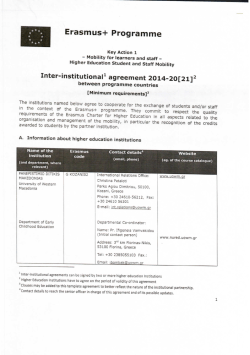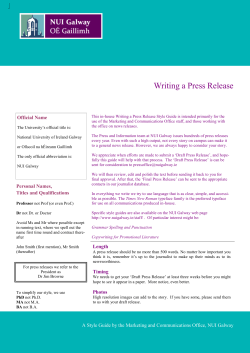
Dámh na nDán Faculty of Arts - National University of Ireland, Galway
The B.A. International option for non-language students A Student Information Evening 29th January, 2014 BA INTERNATIONAL OPTION • Students not studying a continental language • Full Third Year Abroad • All Subjects through English (usually) • Europe • US and Canada Faculty of Arts THE FOUR-YEAR B.A. INTERNATIONAL Final Arts B C THE YEAR ABROAD Second Arts First Arts B Subject A Subject B C Subject C Subject D Studying Abroad: If you are nominated … • You go abroad after having successfully completed Second Year, and you transfer from the 3-year B.A. programme to the 4year B.A. International Programme. • While abroad, you must pass sufficient courses to secure a minimum of 40 ECTS credits (20 credits in each subject). Studying Abroad (continued) • In this way, your period of study abroad is recognised as in integral part of your BA International Degree. • After spending the year abroad, you return to complete your fourth and final year at NUI Galway. Requirements • Period of study must be 1 academic year. • Students are not required to pay tuition fees to the Host University – however, they are required to pay normal registration fees to their Home University. • You remain registered as an NUI Galway student while studying abroad. • The year abroad must be completed successfully (40 ECTS credits). Some terms we use ... Home University: NUI Galway Host University: the university abroad with which we have an exchange agreement, and to which we may send our students Bilateral / Exchange Agreement: a “contract” between 2 universities that allows a particular number of students to be exchanged in a particular subject area Possible study destinations • The College of Arts, Social Sciences and Celtic Studies and its disciplines are linked – through the Erasmus Programme - with a number of partner universities in Europe that offer courses through English. • There are also some links with the USA and Canada. Things to bear in mind • Most of our European partner universities offer courses through English in specific subject areas only. • Limited number of study places available, i.e. competitive process: • Academic record (2:1 average, at least, is recommended) • Statement of motivation • Possibly also a short interview ERASMUS EuRopean Community Action Scheme for the Mobility of University Students So far, across Europe, over 3,000,000 students have participated. Bilateral Agreements between universities in various subject areas allow EXCHANGE of students – NO TUITION FEES. Workload of study period abroad is set out in student’s LEARNING AGREEMENT and is recognised by the Home University. A MOBILITY GRANT may be available to assist with costs. Who can go on Erasmus? • Regardless of nationality, if you are registered at NUI Galway and have completed 1 full year of study, you are eligible to apply for Erasmus. • Non-Irish European citizens will not normally be nominated to study in their birth country. The Advantages of Participation in the Programme • Academic development • Personal development • Cultural and social aspects: – Get to know another country & its culture – Perhaps learn some of the language – Make new friends – Expand your horizons…. • A positive addition to your CV What former Erasmus students say … “I have become more independent and have had time to decide on the possible paths I wish to take once I finish my degree. Enjoy every single minute; it is a chance of a lifetime. You will have so many memories and friends from this.” Katrina Nee, who studied Soc. & Pol. and English at Abo Akademi University, Finland Katrina Nee, Erasmus in Finland 2012/13 “Erasmus – the adventure of a lifetime!” Molly Aitken studied Classics and English at the University of Malta in 2012/13. There follows a list of Erasmus links by country, university and subject(s) IMPORTANT TO NOTE: 1. You will be expected to take 20 ECTS in each of your degree subjects while abroad. 2. Where a particular subject is indicated in purple on this list, you MUST be taking that subject as one of your degree subjects if you wish to apply for a place at this partner university. also important ... • Having satisfied requirement #2, you will have to ensure that you can take 20 ECTS worth of credits in your second subject at that particular host university. • Investigate this by referring to (i) the application form, page 4; or (ii) the host university’s website. You will need to get approval from your 2nd subject dept here. (1) Universities with courses available through English • Belgium – KU Leuven (Soc. & Pol.; Legal Science) • Czech Republic – Charles Uni, Prague (Archaeology) • Finland - Abo Akademi (Soc. & Pol.) - Helsinki (Soc. & Pol.) • Hungary - Eötvös Loránd University, Budapest (Legal Science) • Malta – (University of) Malta (a. Various; b. Maths) Courses available through English (continued) • Netherlands - Leiden (History; Legal; Soc & Pol.) - Utrecht (various) - Groningen (History; Legal Science) • Sweden - Uppsala (Gaeilge; various) - Karlstad (IT) • Turkey - METU (Ankara) (Philosophy) • UK - Aberystwyth (Irish) - Glasgow (Irish; Archaeology) Legal Science students applying for Erasmus ... ... should bear in mind the fact that the Law School’s exchange places are also open to students of Corporate Law and Civil Law, and so there will be competition for these places. Erasmus Links by country, university and subject(s) (2) Good command of French or German required for the following exchange places • Austria - Vienna (History) • France - La Rochelle (IT) • Germany - Bonn (Gaeilge / Celtic Civilisation) - Göttingen (various) - Heidelberg (Soc. & Pol.) - Mainz (History) Websites for European Universities • Please see the ERASMUS application form where we have listed all the university websites along with subject combinations that are possible in each university. Look for links such as “International”, “Exchange/Visiting Students”, etc Other links 1 year Exchange Options: • Boston College, USA 3 places • University of Richmond, USA 1 place • University of Ottawa, Canada 4 places Websites for North American partners Boston College website http://www.bc.edu/offices/international/ University of Richmond website – http://studyabroad.richmond.edu/?go=URExchange University of Ottawa website – http://www.international.uottawa.ca/en/index.html Studying abroad – some terms we use HOME University: NUI Galway HOST University: the university where the student spends the year abroad Academic/Subject Coordinator: A designated staff member in each School/Discipline who will provide guidance on course choice etc, and with whom students are expected to keep in touch before and during their study visit. Requirements (cont’d) • Must consult with BA International coordinator in each of your subjects regarding the selection of modules to be taken at the host university • Target: 40 ECTS in total - that’s 20 in each subject, distributed over 2 semesters (subject to availability and the structure of courses). • Students are responsible for completing the Year Abroad requirements, and making sure that the results are returned to their academic coordinator. Compliance Failure to fulfil the requirements of the Year Abroad will have the following consequences: 1. The student will be obliged to pay fees for the final year of the BA Omnibus. 2. The student will be deprived of the BA International Degree and, on completion of their final year at NUI Galway, will be awarded the BA (Omnibus) degree only. 3. May have to repay Erasmus grant. EILC courses (Europe) • Erasmus Intensive Language Courses • Less widely-used languages – e.g. Dutch, Swedish, Finnish, Flemish, Maltese • Short course before academic year • No tuition fee • Small additional grant (€300) • Will be advertised in May Costs of going to Europe on Erasmus • Total cost for the year will be between €7,000 - €10,000 approx. This includes accommodation, household bills, food, travel, academic materials etc. • Some partner university websites will have information about the costs associated with spending a year studying there. What you should budget for … & what funding is available • General Costs of Living (accommodation; heat/electricity/household bills; food) • Travel costs • Books, etc • Non-tuition fee to NUI Galway • Erasmus Mobility Grant €1,700 (approx.) for the year • Disability/Special Needs Grant (if applicable) • Local Authority Grant (if applicable) • Back to Education Grant (if applicable) Examples of Erasmus grant in 2013/14 for 9-month study visit • • • • • • • • UK: €2,280 Finland: €2,000 Sweden: €2,000 Netherlands:€1,760 Belgium: €1,700 Czech Republic: €1,400 Turkey: €1,390 Malta: €1,395 COSTS for North American universities (with tuition fee waiver) $ € (approximate equivalent ) Boston College US $22,748 €16,900 Richmond University US $15,500 €11,500 CAD $13,000 €9,500 University of Ottawa Funding for North American Exchanges • Boston College – US $5,000 bursary The Application Process – both EU and non-EU • Carry out some research on the destinations available by consulting the different universities’ websites. • Complete the appropriate form (there are 2, one for ERASMUS and one for non-EU). • Return your application form to Catherine McCurry in the College of Arts Office by 4pm on 14TH February (strict deadline). Criteria for Selection • Your Examination results: First Arts and Semester 1 of 2nd Arts • The extent to which you demonstrate having researched your selection • The strength of your Personal Statement • The ‘fit’ between your subjects and your selection (especially for ERASMUS) Selection of candidates • Where a particular Discipline “owns” an exchange link, we will refer the relevant students’ applications to the International Coordinator in that Discipline for his/her recommendation. • Shortlisted candidates for Malta, Uppsala and Utrecht may be requested to attend an interview. What happens then … • The College of Arts, SS & CS and the International Affairs Office make an offer of places by mid-March (earlier for US universities). • If you accept the offer, you will be officially nominated to the relevant Host University as an International student for 2014/2015. • You will need to follow the application procedure for the host university. NUI Galway International Office or your departmental coordinator will advise. Application Material for North American Exchanges • Completed application form from host institution • Examination transcripts from NUI Galway • Up-to-date passport • Proof of Finances (bank statements etc) • Academic reference • Personal Statement North American Exchanges - Visas • Richmond University & Boston College – J1 visa from US Embassy, Dublin • University of Ottawa – Study Permit from High Commission of Canada, London More Information on Erasmus • Erasmus website: www.nuigalway.ie/erasmus “Outgoing Students” • Contact Gisèle Farrell or e-mail erasmus-office@nuigalway.ie North American Exchanges Contact: International Affairs Office international@nuigalway.ie
© Copyright 2025












